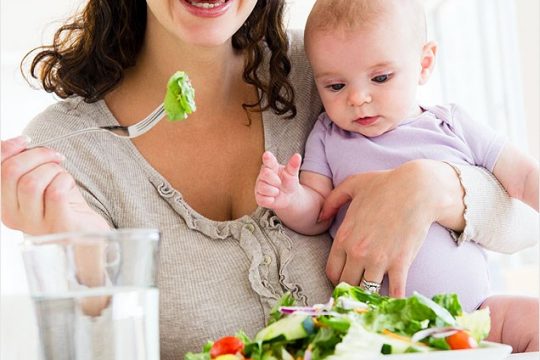
Breastfeeding has all sorts of benefits for both mom and baby.
Breastfeeding is one of those topics that all parents have a view on. Whether you love it or hate it, the NHS, the World Health Organisation and UNICEF all recommend breastfeeding to give babies the best start in life.Not surprisingly, it is incredibly important to eat healthy while breastfeeding.Breast milk is very nutritious and contains most of the nutrients your baby needs for the first 6 months of life.Consequently, your needs for most nutrients are increased in order to meet this demand.Healthy eating will also give you the energy you need to take care of yourself and your baby.What’s more, eating healthy foods may help you shed the pregnancy weight faster.This article explains everything you need to know about eating a healthy diet while breastfeeding.
With the exception of vitamin D, breast milk contains everything a baby requires for proper development during the first six months of life.Generally, an ounce (28 ml) of breast milk contains 19–23 calories, with 3.6–4.8% from protien , 28.8–32.4% from fat and 26.8–31.2% from carbs, mostly lactose.Unlike baby formula, the calorie content and composition of breast milk varies. Breast milk changes during each feeding and throughout your lactation period, in order to meet the needs of your baby.You also have an increased need for most nutrients, so it’s very important to eat a healthy and varied diet.
Eat Nutrient-Dense Foods
Your nutrient needs are greater while breastfeeding, both to fulfill the baby’s needs and your own.The amounts of some nutrients in your diet may directly affect their presence in your breast milk.On the other hand, some nutrients are transferred into breast milk regardless of your intake
It is very important to eat a variety of nutritious, whole foods to ensure that you get all the nutrients you and your baby need.
Here are some nutritious foods you should eat while breastfeeding:
- Fish and seafood: Salmon, seaweed, shellfish and sardines.
- Meat: beef, lamb, pork and organ meats, such as liver.
- Fruits and vegetables: Berries, tomatoes, cabbage, kale, garlic and broccoli.
- Nuts and seeds: Almonds, walnuts, chia seeds, hemp seeds and flaxseeds.
- Other foods: Eggs,oats,potatoes,wuinoa, buckwheat.
Additionally, avoid processed foods as much as possible because they are usually high in calories and unhealthy fats.